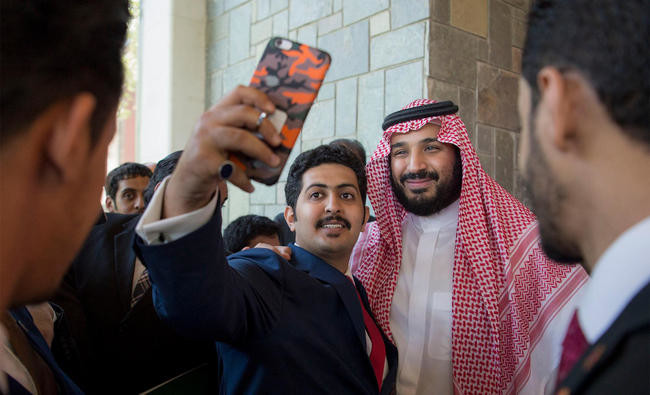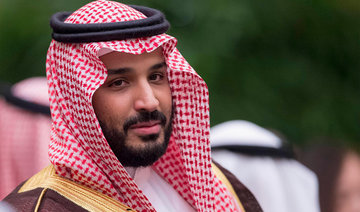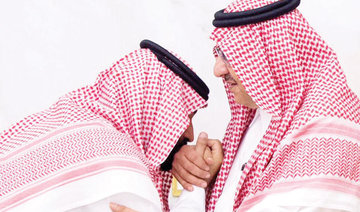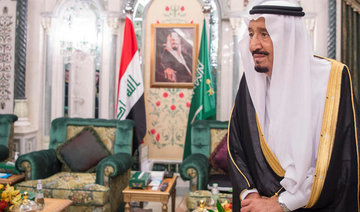RIYADH: Prince Mohammed bin Salman on Wednesday was elevated to the position of crown prince and deputy prime minister, and will maintain his post as minister of defense.
Born on Aug. 31, 1985, Prince Mohammed bin Salman, the son of King Salman, received his education at Riyadh schools where he ranked among the top 10 students in his class. He received his bachelor’s degree in law from King Saud University (KSU), where he graduated second in his class.
Prince Mohammed gained international experience in corporate governance and international finance. He began his political career as a consultant to the Experts Commission under the Saudi Cabinet.
On Dec. 15, 2009, Prince Mohammed bin Salman was appointed special adviser to then-Prince Salman bin Abdul Aziz, who at the time was governor of Riyadh province.
He was also a special adviser to the chairman of the board for the King Abdul Aziz Foundation for Research and Archives (Darah), and then became supervisor of the crown prince’s office.
In March 2013, by royal decree, Prince Mohammed was appointed head of the crown prince’s court with the rank of minister and special adviser to then-Crown Prince Salman. On April 25, 2014, he was appointed as a state minister and member of the Cabinet.
His long history of philanthropic initiatives earned him many awards. In 2011, he established the Prince Mohammed bin Salman bin Abdulaziz Foundation (MiSK), which enables young Saudis to learn, develop and progress in the fields of business, literature, culture, science and technology, and sociology.
Following the demise of King Abdullah in 2015, King Salman ascended to the throne and appointed Prince Mohammed as deputy crown prince, second deputy premier and minister of defense. He has also served as chief of the Royal Court, and chairs the powerful Council for Economic and Development Affairs.
Last year, the crown prince moved into what he described as his most important role: Transforming the Kingdom’s economy and reducing its dependence on oil revenues.
On April 25, 2016, the Saudi government unveiled Vision 2030, including a series of developmental, economic and social programs. The same day, Al Arabiya News Channel aired an exclusive interview with Prince Mohammed. During the interview, the crown prince pledged to end the Saudi economy’s dependence on oil revenues by 2020. Prince Mohammed also discussed measures to lift subsidies on the Kingdom’s wealthy citizens and assist the country’s poor.
The measures, as part of Vision 2030, will be implemented on everyone, “including princes and government ministers,” Prince Mohammed said. “This is a promise.”
In an interview with prominent news outlet Bloomberg earlier in April 2016, Prince Mohammed discussed the Kingdom’s soon-to-be unveiled National Transformation Plan (NTP) 2020, part of Vision 2030.
At the time, he told Bloomberg that the Kingdom would dramatically expand its Public Investment Fund, a sovereign wealth fund, to reach around $2 trillion in assets. The sale of around 5 percent of Saudi Aramco’s shares would be placed into the fund, he added. “What is left now is to diversify investments,” he said. “So, within 20 years, we will be an economy or state that doesn’t depend mainly on oil.”
In a second, even longer interview with Bloomberg later that month, Prince Mohammed further expanded on his plans to transform the Kingdom’s economy. The interview also highlighted the prince’s personal life — his long hours, fluency in English, love of reading books by Sun Tzu and Winston Churchill, and his choice to have just one wife.
The crown prince has represented King Salman abroad, traveling to Beijing, Moscow and Washington, where he met President Donald Trump in March.
In an interview with Al Arabiya, former US President Barack Obama described him as “extremely knowledgeable, very smart” and “wise beyond his years.”
Last year, Prince Mohammed visited Silicon Valley to sell his vision of market-oriented reforms and a transformation of the Kingdom’s economy and society.
In recent years, Prince Mohammed has become the government’s face of reform, modernization and change. In the Kingdom, where around 60 percent of the population is under 30, the young crown prince is widely seen as an icon in the push toward socio-economic reforms.
Profile: Saudi Crown Prince Mohammed bin Salman
Profile: Saudi Crown Prince Mohammed bin Salman

From Genoa to Jeddah: Italian vessel docks to grand welcome

- The 33rd stop of Amerigo Vespucci’s world tour brings Italian charm and heritage to Saudi Arabia
- Italian Minister of Defense Guido Crosetto: We are very proud of this ship, and we are happy to share our journey with our Saudi friends
JEDDAH: The Amerigo Vespucci, a historic training ship of the Italian Navy, docked at the Jeddah Yacht Club and Marina on Monday morning, where it will be open to the public until Jan. 30.
The ship is on the 33rd stage of its two-year world tour, which began on July 1, 2023, from the Port of Genoa, Italy, traversing five continents, 30 counties and 35 ports before its return to the Mediterranean.
The ship is named in honor of Amerigo Vespucci, the Italian explorer from the late 15th and early 16th centuries. Vespucci was among the first to understand that the lands Christopher Columbus reached in 1492 were not part of Asia but rather a separate continent, which was later named America in his honor by the German cartographer Martin Waldseemuller in 1507.
The inaugural ceremony of the Villaggio Italy in Jeddah, which also kicked off visits on board the 93-year-old ship, took place in the presence of Saudi Assistant Minister of Defense Talal bin Abdullah Al-Otaibi, as well as Italian Minister of Defense Guido Crosetto and Chief of Staff of the Navy Adm. Enrico Credendino.
Also present at the ceremony were Ambassador of Italy to Saudi Arabia Carlo Baldocci; Minister of Tourism Daniela Santanche; Minister for Disabilities Alessandra Locatelli; Deputy Minister for Enterprise and Made in Italy Valentino Valentini; Undersecretary of State for Defense Matteo Perego di Cremnago; Undersecretary of State for Defense Isabella Rauti; and Consul General of Italy in Jeddah Leonardo Costa.
Marking the latest stop on the ship’s world tour, Crosetto said: “This is not an easy ship because it did not rely on modern technology but relied on human skills.
“We are very proud of this ship, and we are happy to share our journey with our Saudi friends.”
He paid tribute to the long friendship between the Saudi and Italian people: “This is a testament (to) the growing relationship between the two countries, the growing ties in the fields of politics and diplomacy, economics, security and defense, culture, science, sports and much more.”
Al-Otaibi welcomed the Amerigo Vespucci to Jeddah and expressed Saudi Arabia’s appreciation for this gesture, acknowledging the significance of the event in promoting peace, security, and cooperation.
He noted that the arrival of the ship underscores the commitment of both nations to expanding their naval partnership and reflects a broader effort to enhance diplomatic and military ties.
Speaking to Arab News, Costa said: “The Amerigo Vespucci’s visit to Jeddah reflects the enduring friendship between our nations. We are honored to share Italy’s naval legacy with the people of Saudi Arabia.
“It is not only that we are sharing the arrival of the Amerigo Vespucci ship but we (are) also sharing our culture, art, music, food and history at the Italian Village, which will be open to (the) public starting Tuesday,” he added. “Therefore, I encourage everyone to take advantage of this unique chance to step aboard one of the world’s most iconic ships.”
After 19 months on board the Amerigo Vespucci, Capt. Giuseppe Lai, commander of the ship, told Arab News that it has been a challenging journey: “We are so proud to reach our 33rd stage here in Jeddah for the first time.
“We are very proud to show the value and history of Italy, but at the same (time), we are pleased to learn more about other cultures and know other people.”
He noted that the ship is scheduled to complete the tour on June 10.
Following stops in Los Angeles, Tokyo, Darwin, Singapore, Mumbai, Doha, Oman and Abu Dhabi, the Villaggio Italia will be hosted, together with the Amerigo Vespucci, at the Jeddah Yacht Club and Marina.
Villaggio Italia is an international exposition showcasing Italy’s finest products and industries, reinforcing the country’s values and promoting its culture globally.
As part of its Jeddah stopover on an ongoing world tour, the 1930-built ship is hosting a series of engaging events including a painting competition, film screenings, and a concert by the Italian Air Force band.
On-board visits will be available from 2:30 p.m. to 5:30 p.m. on Tuesday and Wednesday, as well as a morning slot from 9:30 a.m. to 12:30 p.m. on Wednesday.
Umrah guests praise Kingdom’s rich heritage

- Sheikh Khadem Mbaki, a preacher from Senegal, expressed his joy at witnessing Madinah’s rich cultural and historical heritage
- Ali Coulibaly from Mali said that the Kingdom is a global religious and cultural destination
RIYADH: Guests of the Custodian of the Two Holy Mosques Program for Umrah and Visit praised Saudi Arabia’s development and progress across various fields.
They commended efforts to preserve religious sites and historical monuments, highlighting a rich cultural heritage spanning thousands of years, the Saudi Press Agency reported.
During their tour of religious sites and monuments in Madinah, part of a program organized by the Ministry of Islamic Affairs, they expressed gratitude to the Kingdom for hosting them.
Sheikh Khadem Mbaki, a preacher from Senegal, expressed his joy at witnessing Madinah’s rich cultural and historical heritage.
He highlighted how the sites reflect various aspects of Islamic civilization, and praised the Kingdom’s dedication to preserving these important landmarks.
Mbaki also acknowledged the Kingdom’s efforts to ensure the well-being of visitors and Umrah performers from around the world.
Ali Coulibaly from Mali said that the Kingdom is a global religious and cultural destination due to its many historical monuments and archaeological sites in regions like AlUla and NEOM.
He also noted the rapid development of infrastructure projects, which enhance the Kingdom’s ability to welcome tourists and visitors and provide year-round access to these historical and cultural sites.
Mohammed Abdo Abu Yaali from Morocco praised the cultural and historical richness he experienced during his visit to Madinah’s historical sites.
He appreciated the in-depth explanations about the significance of these sites as well as their connection to Islamic history and the life of the Prophet.
Amin Baddad from Algeria expressed his heartfelt thanks to the Saudi leadership for hosting him to visit Madinah and perform Umrah.
He shared the beautiful memories created during his visit and prayed to Allah to reward those responsible for the program for their efforts.
Riyadh governor receives newly appointed ambassador of Zimbabwe

- Prince Faisal wished the ambassador success in his new duties
RIYADH: Riyadh Gov. Prince Faisal bin Bandar received the newly appointed ambassador of Zimbabwe to the Kingdom, Jonathan Wutawunashe, in Riyadh on Monday.
During the meeting, Prince Faisal wished the ambassador success in his new duties. The two sides also discussed issues of common interest, the Saudi Press Agency reported.
Meanwhile, Hail Gov. Prince Abdulaziz bin Saad bin Abdulaziz held cordial talks with Ambassador of Sudan to the Kingdom Dafallah Al-Haj Ali Othman in Hail on Monday.
Saudi FM holds phone call with Malaysian counterpart

RIYADH: Saudi Foreign Minister Prince Faisal bin Farhan held a phone call on Monday with his Malaysian counterpart, Dato’ Seri Utama Haji Mohamad bin Haji Hasan.
During the call, the chief diplomats discussed relations between Riyadh and Kuala Lumpur, the Saudi Press Agency reported.
Outgoing US ambassador praises transformation in Saudi Arabia

- Ambassadors from the US, Egypt and Oman bid farewell to the Kingdom
- Dean of the diplomatic corps hosts farewell ceremony for outgoing envoys
RIYADH: The dean of the diplomatic corps accredited to Saudi Arabia, Dya-Eddine Said Bamakhrama, hosted a farewell ceremony for outgoing ambassadors of the United States, Egypt and Oman at the Cultural Palace in Riyadh on Monday.
“We have gathered here for ambassador of Egypt, Ahmed Farouk, ambassador of Oman, Sayyid Faisal bin Turki, and the US ambassador Michael Ratney. The meeting marks the conclusion of their tenure as ambassador to Saudi Arabia. We have them here representing three continents, Africa, Asia and America,” Bamakhrama said in his opening remarks.
“All of them were very close to me and to many of our colleagues. Ambassador Farouk was here for more than five years, which is extraordinary for an Egyptian ambassador. Sayyid Faisal was my neighbor in the DQ (diplomatic quarter) and we had a great time. Michael has been here for two years. I wish them all the very best in their future endeavors. We will miss you, and wishing you all the best,” said Bamakhrama, who is also Djibouti’s ambassador in Riyadh.
On behalf of the diplomatic corps Bamakhrama presented souvenirs to the outgoing ambassadors.
At the same event he introduced new ambassadors in Riyadh from Romania, Serbia, Sierra Leone, Bangladesh, Sri Lanka, Nepal, Syria, Palestine, Peru and Uruguay.
Ratney, in his farewell speech, said: “I wish I were staying in this country longer. It’s been, for me, an amazing experience to have a front row seat for what’s going on in Saudi Arabia, the amazing transformations of this country. And to have played even a small part in strengthening the relationship between Saudi Arabia and my country was an honor.
“Saudi Arabia is a country of tribes,” he said. “I feel like you are my tribe. Every time I walk in this room or one of your homes or an event, I feel like I am home. And I tell you, when I got to the country and started meeting the diplomats, I remarked that the quality of diplomats that all of your governments were sending to Saudi Arabia was extraordinary. And I thought, I need to step up my game. You all gave me a standard to try to meet, and it’s been just an extraordinary pleasure every time I am with you. I will miss all of you. I hope this is the end of my 34-year diplomatic career, and it’s time to move on.”
Farouk at the gathering said: “Thank you all for convening all our distinguished colleagues here. I have mixed feelings after 40 years of diplomacy since 1985. This is the end of my diplomatic career, and I believe that life has to come to a crossroads sometime.”
On a lighter note he added that sometimes there is a chance to make a U-turn and come back.
“I am glad, and I feel that I have achieved something for my country in Saudi Arabia,” he said. “I wish you all the best and wish the very best in your future endeavors, we will be in touch.”
Bin Turki said: “Just like my colleagues, I think, I definitely have mixed feelings. As a non-diplomat, I joined the ministry of foreign affairs in 2017. I never thought I would be appointed as an ambassador, but I ended up being an ambassador. And the first thing I had in mind when I came here, I said I wish they would give ambassadors a manual, the do’s and don’ts, but it doesn’t happen.
“For someone who is not coming from that background it’s quite a challenge. And the first thing I told my team when I walked into the embassy, I said, I have two options: I either become a classic ambassador, or someone who thinks out of the box. And I said, you will be teaching me everything that you are good at as diplomats, and I will be sharing with you everything that I know as a non-diplomat. And now I am the new diplomat. And it has been an extraordinary journey in this country, an amazing place. Four years, and it feels like yesterday.
“I keep telling people about the amazing things that are happening in Saudi Arabia and the amazing people that I meet every day. It’s a journey and I would like to thank everyone, the dean of diplomatic corps, all of you extraordinary people. I learned a lot and back home, I would love to share those stories, whether it’s with family and others as well.”
























